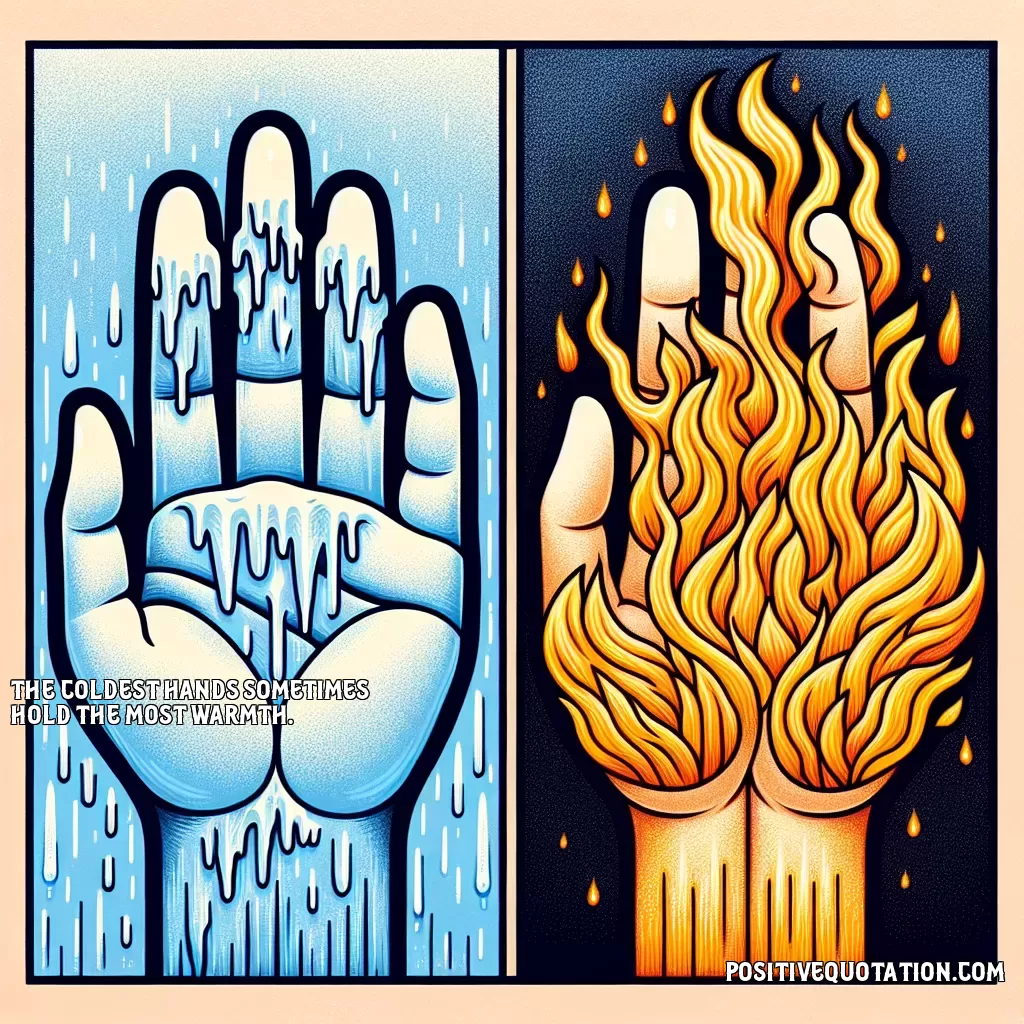
The coldest hands sometimes hold the most warmth.
Author: Shane Koyczan
👁️ 11 views
The quote "The coldest hands sometimes hold the most warmth" is a metaphorical expression that suggests there can be depth and warmth beneath a seemingly cold or uninviting exterior. It invites us to consider the idea that individuals who outwardly seem distant, reserved, or emotionally cold might actually possess great kindness, compassion, and warmth within them. At first glance, when we think of "cold hands," we might picture someone physically uncomfortable or emotionally detached. However, this quote subverts that expectation by associating cold hands with inner warmth, encouraging us to look beyond appearances and initial impressions. The notion of warmth, in this context, symbolizes qualities like empathy, love, and understanding. This quote can also speak to the human experience that sometimes those who have faced the harshest challenges, who may have built protective walls around themselves as a result, can have the deepest capacity for warmth and generosity. Their coldness is not indicative of their true nature but rather a shield or a result of circumstances they have endured. Moreover, this expression suggests that we might find compassionate and loving traits in unexpected places. It serves as a reminder that people often have hidden depths and complexity, and we might be pleasantly surprised if we take the time to get to know them beyond superficial judgments. Thus, "The coldest hands sometimes hold the most warmth" encourages empathy, open-mindedness, and a deeper look into the hearts of those we might otherwise overlook.
Quote By: Shane Koyczan
Shane Koyczan is a celebrated Canadian poet, spoken word artist, author, and musician, renowned for his evocative use of language and poignant exploration of personal and societal themes. Born on April 22, 1976, in Yellowknife, Northwest Territories, Koyczan faced the trials of bullying and isolation during his childhood, experiences that would later permeate his work. His ability to articulate complex emotions and social issues has made him a powerful voice in contemporary poetry.
Koyczan gained widespread recognition with his deeply moving poem "To This Day," which addresses the effects of bullying and the importance of self-acceptance. The poem went viral after being animated and shared widely on various online platforms, resonating with audiences around the world. Shane Koyczan's unique combination of spoken word and visual artistry captured the hearts of many, prompting discussions about mental health, resilience, and the impact of words.
In addition to "To This Day," Koyczan has published several collections of poetry, including "Visiting Hours" and "Stickboy." His work often reflects his experiences as a marginalized individual and emphasizes the need for connection, understanding, and compassion in a world that can often feel hostile. Through his performances, Shane Koyczan invites listeners to engage with difficult subject matter while offering solace and hope, making his work accessible to a diverse audience.
Koyczan’s influence extends beyond the page and stage; he has been a vocal advocate for mental health awareness and anti-bullying initiatives. His artistic journey also includes collaborations with musicians and other artists, expanding his reach within the creative community. In 2019, Koyczan released his graphic novel, “Stickboy,” which further explores themes of bullying and identity through visual storytelling.
In recognition of his contributions to literature and the arts, Shane Koyczan has received numerous awards, solidifying his place in the canon of contemporary Canadian literature. As he continues to inspire and uplift others through his work, Koyczan remains a vital figure in poetry, a champion for kindness, and a reminder of the transformative power of words.